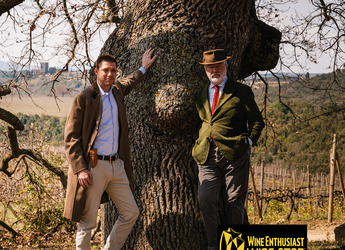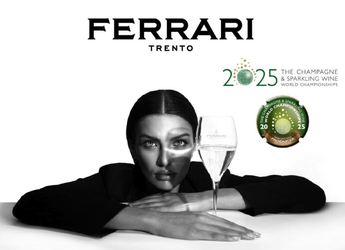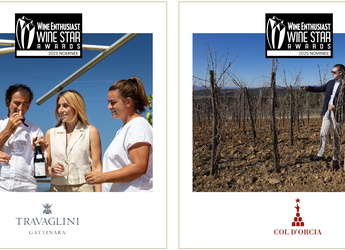
Callia Wines: Fruit-Friendly, Youthful + Dynamic

Founded in 2002, Bodegas Callia burst onto the Argentinian wine scene with an ambitious goal — to craft the best wines in San Juan. After only two short decades, the estate has established itself as a key producer in the region, making high-quality, delightfully approachable wines.
Bodegas Callia belongs to the Salentein Family of Wines, which consists of three estates founded by the late Dutchman Mijndert Pon. Mijndert fell in love with Argentina after visiting in the 1990s. His passion for the land and its people is carried on at Bodegas Callia by his children, who run the business, as well as vineyard manager Gustavo Matocq and head winemaker Gustavo Daroni.
Located in the Tulum Valley in San Juan’s Caucete district, the Callia winery cultivates 283 hectares / 700 acres of vineyards. Though the region has an arid, desert climate, it’s surprisingly fertile. In fact, Bodegas Callia takes its name from a legendary young woman, who moved to San Juan and described it as a desert paradise endowed with abundant fruits. The hot temperatures and dry conditions yield intensely flavorful, concentrated grapes that the team vinifies with minimal intervention, resulting in Callia wines’ signature fruit-friendly, youthful, and dynamic style.
Along with crafting top-notch wines, the Bodegas Callia team remains committed to protecting the land from which they are born. When building the winery, the team plotted around the native vegetation and used the most advanced anti-seismic techniques to avoid disrupting the landscape wherever possible. Today, they’re converting the vineyards to organic agriculture and have implemented several sustainability-focused practices to help safeguard their beautiful desert valley for future generations.
While Bodegas Callia is serious about quality winemaking — and it shows in their marvelous wines — the team doesn’t want wine lovers to take the wines too seriously. With their fruity, easygoing charm, Callia wines are meant to inspire wine lovers to find some “me” time and reconnect with themselves and others. They hope Callia wines will be one of the many simple pleasures that make up a happy, balanced life.
Bodegas Callia Highlights
Founded in 2002 by Mijndert Pon, Bodegas Callia is part of the Salentein Family of Wines.
Bodegas Callia lies in the Tulum Valley in San Juan, Argentina, which has an arid, yet fertile, desert climate.
The estate’s sustainability efforts include converting the vineyards to organic agriculture, monitoring its water-use and carbon footprint, and establishing a recycling program.
Made with minimal intervention and totally vegan, Callia wines are naturally fruit-forward, youthful, and dynamic.

-
Founded
2002 -
Location
Tulum Valley, San Juan, Argentina -
Follow On
Argentina’s Desert Paradise
Bodegas Callia lies in the Tulum Valley of San Juan, within the larger winemaking area of Cuyo in the center-west of Argentina. Cuyo means “desert country” in the indigenous Huarpe Millcayac language, yet even with its arid climate, the region remains impressively fertile and represents 95% of Argentina’s wine production.
Embodying this contradiction, Bodegas Callia takes its name from a legendary young woman who moved to San Juan and poetically wrote about it as a paradise endowed with abundant fruits, despite the desert landscape. Given her description, it’s little surprise that Mijndert Pon chose to pursue winemaking in San Juan.
The Natural Advantages of the Tulum Valley
Situated in the Andes Mountains, at roughly 600 meters / 2,000 feet above sea level, the Tulum Valley in San Juan’s Caucete district is a wonderful place for viticulture. The arid climate lessens the risk of mildew and other diseases, so vines stay healthy without the use of chemicals. Year-round sun exposure means grapes ripen fully, and in the summer months, the temperature climbs so high that the vines can go dormant for a couple hours, which naturally moderates production levels and prevents the fruit from over-ripening. The heat is also offset by cooling mountain breezes, which help grapes retain freshness. All combined, these conditions yield juicy, concentrated grapes that give wines from Caucete their trademark fruit-forward, rounded, yet still vibrant, profiles.
Handcrafted Wines From San Juan, Argentina
At Bodegas Callia, head winemaker Gustavo Daroni and his team strive to craft high-quality Argentinian wines that exude a fruit-friendly, youthful, and dynamic charm. After careful harvesting (some of which is done painstakingly by hand), the vineyard team rush the grapes to the winery where they are immediately crushed and destemmed to preserve freshness and each variety’s natural fruit character.
The estate’s whites do not undergo oak aging, letting their primary fruit flavors shine (while the reds are given subtle oak aging). All Callia wines are vegan-friendly and have an uplifting vibrancy that encourages wine lovers to savor the simple pleasures in life.
The Passion Behind Callia
Mijndert Pon, a Dutchman and retiree of the auto industry, fell in love with Argentina when he visited in the 1990s. His passion for the land and people fueled a 20-year wine career, and he founded Bodegas Callia in 2002. Today, his children Frederike, Mariette, and Ben carry on his legacy, working alongside vineyard manager Gustavo Matocq and head winemaker Gustavo Daroni.
Gusatvo Matocq holds a master’s degree in viticulture and enology science and worked as a consultant for 20 years. He’s been at Bodegas Callia since 2011 and is also a professor at the College of Agricultural Sciences of the National University of Cuyo, Mendoza. Winemaker Gustavo Daroni attended the Instituto Superior de Enología de San Juan and oversees day-to-day operations at Bodegas Callia.
Fully Committed to Sustainability
Sustainability, from the vineyards to the bottled wine, is at the heart of everything Bodegas Callia does. Since 2013, the estate has participated in the Self-Assessment Argentine Sustainability Protocol for Wineries. It received certification in 2017 and was recertified in 2020. Moreover, vineyard manager Gustavo Matocq and his team are working to convert the vineyards to fully organic farming.
Given the Tulum Valley’s desert climate, the team closely monitors their water-use footprint and has installed a drip irrigation system in each Callia vineyard to keep consumption as low as possible. They also track their corporate carbon footprint and continuously aim to reduce emissions. The estate’s recycling program ensures that all cardboard, plastic, glass, and metal waste is properly recycled. Finally, Bodegas Callia produces vegan wines according to the LIAF CONTROL process, meaning the team doesn’t use any animal-derived products.













